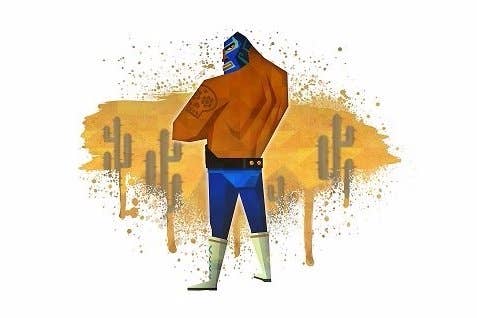Drinkbox's 10 biggest f---ups
Guacamelee developers offer simple advice inspired by their biggest mistakes
It's not uncommon at the Game Developers Conference for successful developers to give talks sharing all the things they think they did right on the way to success. It's less common to see a talk like Drinkbox Studios designer Chris McQuinn and co-founder/producer Graham Smith gave Wednesday, with developers from a successful studio sharing a list of their "10 Biggest F---Ups."
The Toronto-based studio has enjoyed success with games like Guacamelee and Tales from Space: Mutant Blobs Attack, and is finishing up work on its PS Vita-exclusive Severed. As good as those games were or will be, McQuinn said they also bred some of the studio's biggest mistakes, which is what inspired the pair to share tips with their fellow developers in the hopes they can make smarter decisions earlier.
1. Always Get Referrals
Smith said one of the first big mistakes happened when they were applying for a scientific research tax credit in Canada. They employed a consultant to help apply for the benefit, but didn't do much research on him beforehand. He advised them to claim all of their employees' salaries under the tax credit, and they deferred to his expertise. Within a few weeks of filing taxes, the studio received word it was being audited by the Canada Revenue Agency. It would have been a trivial amount of legwork to find a more reputable consultant, but they skipped that step and instead spent a huge amount of time trying to clean up the mess after the fact.
2. Workplace Comfort is Important
McQuinn said you want to save money where you can as a small developer, so you often get "affordable" dev spaces without central AC, or places that have radiator heating that doesn't work and they don't have control over. In the summer, temperatures in Drinkbox's working space would get as high as 102 Fahrenheit in the office, and in the winter, it would get below 24 Fahrenheit. They got small AC units and space heaters, but it didn't do the job. Eventually spent the money for industrial size AC/heating units and blinds that actually addressed the problem, but McQuinn said they tried to work around it for far too long.
There was also an issue with a slow toilet. Because they didn't have anyone on staff for maintenance, the problem got worse and worse until it clogged completely. Eventually they just wound up walking down to the local Starbucks every time they needed to use the bathroom, wasting hours of work time before they finally called a plumber and got the toilet fixed.
"We learned the hard way that a key to our success is ensuring the atmosphere is decent at work so people can be happy, motivated, and creative," Smith said.
3. Plan Your Launch Date Carefully
Smith said for the first game, About a Blob, they announced their launch date through press release and only found out later about other games coming out on that date, including the first free PlayStation Plus game, Stacked. They stuck to the date figuring that they had already committed, but they had little name recognition or marketing, and the game's sales flatlined on launch. Now they're being more flexible. They had planned to launch Severed on May 10, but when Uncharted 4 was pushed to that date recently, they moved it again.
4. Use a PR Company
In 2010 and 2011, Drinkbox went to PAX Prime, but figured they were too small and indie for a professional PR company to be worth the expenditure. But when they divided the money they spent on the trip by the number of resulting articles online from media, the average cost per article was about $1,000. They asked other exhibitors who seemed to have more media come through their booths what they were doing and the answer was simply that they had employed PR companies. In future shows, they used a PR company and the price per article came down drastically. Now that the company is a bit more established, they might not need to spend as much on a PR company, but at the time, the cost of hiring a company was easily made up for by the additional coverage--and subsequent sales--of their games.
5. Choose Your Ports Wisely
Mutant Blobs Attack was the company's PS Vita launch title. It did well, but they wanted to get the biggest possible return on it, so they brought it to PC and consoles. Unfortunately, the game was designed around the touch screen and tilt-sensitive Vita hardware, so it wasn't well suited to the other interfaces and relied on sub-optimal control implementations. The Metacritic scores for the ports were indicative of this, and while they were a little profitable, Smith said it might not have been worth the damage to the company's reputation and average Metacritic score. When Guacamelee came out, they got plenty of offers to adapt it to mobile, but turned them down because they didn't think it would work, and the extra money wasn't worth damaging trust in the studio's name.
6. Buffer Time for Your Buffer Time
McQuinn talked about a PAX Prime in Seattle where they planned to arrive the day before the show by flying through Calgary. Unfortunately, they missed their connection and the next flight they could get wouldn't arrive until two days into the show. So they rented a car and drove overnight to reach Seattle at 8:30 a.m., just in time for their first interview appointment. The upside was they discovered the sunrise in Montana is lovely, but the much larger downsides included being attacked by wild dogs at a rest stop and being exhausted heading into the first day of the show. Now they show up a full business day ahead of time for any such shows so they can start fresh.
7. Handle Side Projects Carefully
When Drinkbox started in 2008, Smith said the studio used a boilerplate contract with a standard clause that said something along the lines of anything people work on while employed is property of Drinkbox. But people on the team wanted to pursue side projects and new hires already had things in the works. They figured there were benefits to letting people work on things outside of work, so they decided to allow employees to have those side projects.
Unfortunately, that led to conflicts of interest for those employees. People were calling in sick because to crunch on their side games for an IGF deadline, saving ideas for their project instead of Drinkbox's, or competing against Drinkbox for some of the same government grants. Some people even worked on their side projects at Drinkbox during work hours. Ultimately the studio decided they hadn't been keeping close enough tabs on the side projects, and the developers didn't understand exactly what expectations the company had for them in terms of their side projects. So now their employment contract includes a clause that says the board of directors has to sign off on the project. They also spell out expectations better, which has helped avoid further problems.
8. Beware of Hidden Costs
Going to shows requires spending on extra equipment, and renting from show organizers is pretty expensive. After a while, they found an external rental company for a show and found cheaper equipment, but got a $2,400 charge in dryage fees. As Smith explained, dryage fees are when you bring your equipment to the hall, then union workers take it the final yards to the booth and charge an arm and a leg for it. Now they buy their equipment wherever they go, and sometimes just give it away at the end of the show because it's cheaper to buy the stuff outright instead of rent it at outrageous costs. Every dollar counts, but you can't waste too much time trying to save money, because that costs money itself, McQuinn said.
9. QA Patches Thoroughly
Shortly after Guacamelee's launch, Drinkbox planned a patch that would let players change costumes in the game. They released it and immediately saw on Twitter that there was an issue where players would get turned into a chicken and be unable to change back, effectively halting progress in the game. They had to pull the patch urgently, but the affected people had to wait a few weeks for a patch to get through certification (or start the game over, which also wasn't ideal). It was a simple fix, but because they didn't QA the patch thoroughly they caused big problems for hundreds of users. They're much more careful now, and expect QA on patches to be potentially more difficult than the original release.
10. Stay Cool
Three or four years ago, Drinkbox tipped off a handful of media with a confidential email about how they were looking to make an updated version of Guacamelee. Unfortunately, it wasn't especially clear that the email was intended to be confidential and an IGN writer posted it on the site as a news story. They contacted the site, which pulled the article, but the news was already out. Another "very, very large media outlet" got in touch to ask for info, and McQuinn asked them to ignore it. They wrote back and said they were going to post about it anyway.
"So at this point you get kind of angry and pissed," McQuinn said. "You say to yourself, if they post this information, they are jeopardizing our business and potentially making us lose sales."
But rather than go nuts and burn their bridge with the large unnamed site, McQuinn said they struck a deal where the site would report on the new Guacamelee, but not Severed, which had also been mentioned in the email. It was an acceptable solution and they still have a good working relationship with the site to this day.
"A lot of these were small problems, that had we just dealt with them immediately or put a bit of time into the initial issue, it wouldn't have transformed into this monster problem," McQuinn said.









